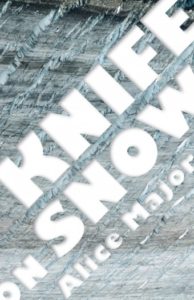Knife on Snow
About this book

In this 12th collection of poetry, Alice Major lays out issues facing us all today—the climate crisis, our human tendency to default to anger and conflict, our location in a larger solar system (which we look at through our all-too-human lenses). The book continues her long interest in science, but also the connections forged by history and the narratives of mythology.
In the long title poem, a knife dropped inexplicably on her snow-covered yard becomes an invitation to contemplate our human craving to find messages from the heavens as well as the deep history of conflict and colonization. “A Fate for Fire” explores how humans have been so connected to fire, while the sonnets of “The Last Ediacarans” put the poet’s life into the framework of geology. These are clear-eyed observations of the human condition at a difficult, complex time.
However, the book doesn’t predict apocalypse, even if people often tend to. Instead, the poet is ruefully conscious of her own personal “end times” but also aware that the world goes on—a valuable, even hopeful perspective.
Available from Turnstone Press
Alice Major writes:
“What’s your new book about?” people ask – and I have had a hard time answering. What’s any pile of umpteen different poems about? Everything from apocalypse to gardening…
But that’s not good enough. People are quite entitled to ask what might interest them about a book in advance of reading it. Or even in the interest of keeping a friendly conversation going over coffee. So, what’s my book about?
“Knife on Snow” is a book about being here, at this point in human history and knowing—really knowing, perhaps for the first time in my life—how deeply connected we are to the past. It’s about the utter continuity of time: the long narratives of people and fire, the surge of empires, the deep history of life on earth, even of the solar system itself. It’s about what falls from the sky—apparently random, but never without cause.
The trigger for the title poem was going out into my Edmonton backyard one winter night to find a large knife lying flat on the snow. Where on earth had it come from? There were no footprints; the caragana hedges around the yard are high and protective. Somehow this ordinary, inexplicable object on the untrodden white really spooked me.
It also made me realize how much I feel this piece of property is “mine” and shouldn’t be trespassed on. At the same time, I’ve become very aware that I have come to live on what’s now called “Treaty Six territory” with its long, fraught history of relations between Indigenous people and settlers. It’s disconcerting to realize that you’re part of this history: You arrive somewhere through an almost random set of events—almost as if you’d been dropped from the sky yourself—and then realize you’re caught up in ongoing currents that go back to ancient empires on the other side of the ocean.
So the book crystallized around being here, at this point in human history and at this particular point in my own life.
Experience a poem
The dream opens – Video recording on AllLitUp YouTube
Reviews
“Major is at her most lyrical, expansive and incandescent in the collection’s long poems. “We’ve told so many tales/ of doomsday,” she writes, and this doomsday is more imminent and true: “the reckoning of Ragnarok arrives (… .)/ No wonder the young are shaking angry fists/ afraid the lid is coming down on us.”
– Melanie Brannagan Frederiksen, Winnipeg Free Press
“Something I’ve always admired about Alice Major’s writing is the way she manages to make me think. She does this in super-specific under-the-microscope ways, but also just as grandly on a scale that’s universal. And she achieves both of these in her latest collection of poems, Knife on Snow. …
… The final section, ‘Travels in the solar system’ is exactly that—a tour through the planets, moons and comets that comprise the system we live in. All the poems here rely upon haibun as their form. Each offers beautifully presented odd facts, anchored by a bit of haiku which, in the case of the piece about Earth, bears surprising weight for such a few lines:
“Bleep, bleep, bleep.” An SOS
broadcast to the solar system—
“We need help here. Over.”
– Heidi Greco, Miramichi Reader
“The nine-part piece, “A fate for fire,” is a powerful opening poetic sequence. Dawn arrives as a dragon torn straight out of Beowulf, dragging “its grey tail/from sky’s flat surface and citizens woke/to no blue summer.” Here is a poem with images that haunt the reader. …
“…Alice Major’s Knife on Snow is a call to awareness and hope in so many ways. … Forgetting that interwoven aspect of life on earth is egocentric and narrow-minded. Some kind of world will last, she tells us, but what will remain? As if to offer a possible notion, the last section of the collection is titled “Travels in the solar system.” A beautifully crafted series of haibun poems that end with reflections on our self-centredness: “Morning. Social media/the first light we turn to./Brain chemistry changes.” and “One more item ticked/off the bucket list. What to post next/on the photo feed?” Perhaps not much will remain after we disappear, as we’ve become so solipsistic as a society. Perhaps we ought to learn from the natural world before it’s too late.”
– Kim Fahner, periodicities: a journal of poetry and poetics
“… The two other long-ish pieces in the book, the titular poem and “The last Ediacarans” also represent Major at her strongest, that rare ability to fuse ancient knowledge (respectively the soldier-historian Marcellinus and mysterious fossils) with human feeling. In the first, Major’s entree is the literal implement/weapon tossed in her backyard, “the metal wedge/stamped on snow. /My small, staked territory,” while the other is research that leads to such revelations on mortality and endurance like: “From the torrent pouring on without me/something will survive. A world will last./And sometimes, in the stone-slow change to fossil/our soft parts wear away but leave a cast.” Beautifully poised couplets with a pang of end rhyme. …
… Major is accessible without dumbing her vision down, and her ear keeps to an organic unfolding that intrigues, satisfies and yet keeps this reader yearning to re-read.”
– Catherine Owen, Marrow Reviews
